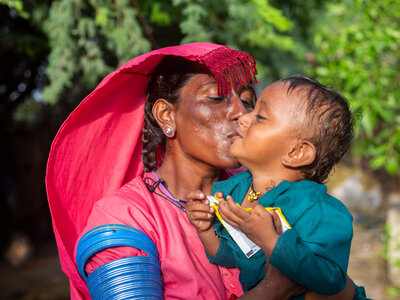Pakistan
- 20.7%
- of the population is undernourished
- 40%
- of children under 5 are stunted
- 241 million
- population
Despite progress, the nutrition and hunger situation remain serious in Pakistan, with a ranking of 109th out of 127 countries in the 2024 Global Hunger Index.
It is ranked as the eighth most vulnerable country to the impact of climate change, and has been subject to unprecedented floods. The country is enduring one of its most devastating monsoon seasons in recent years - over 5 million people are affected by intense floods and more than 870 lives have been lost. As rains persist and rivers swell, the number of people affected is expected to rise further.
It struggles with high multidimensional poverty. Nearly half of an average household’s monthly expenditure goes towards food and 82 percent of the population cannot afford a healthy diet.
Women and girls face significant barriers in accessing government services due to deep-rooted social and cultural norms. Nationwide, over 26 million children aged 5 to 16 are out of school – more than half of them girls.
A total 18 percent of children under 5 suffer from acute malnutrition, and around 40 percent of children are stunted (impaired growth due to malnutrition).
Record-high food and fuel prices, exacerbated by climate change affecting agriculture and infrastructure, have taken a toll on Pakistan’s most vulnerable people.
The World Food Programme (WFP) works with the Government and partners to improve food security and nutrition among the poorest households and the most vulnerable communities across the country. In response to ongoing and severe floods, WFP is working with the Government and partners to deliver emergency support and early recovery assistance.
To complement life-saving humanitarian assistance in emergency contexts and gradually lessen dependence on external assistance, WFP is investing in building long-term resilience through stunting prevention, disaster risk reduction, strengthening of food systems and livelihood activities.
What the World Food Programme is doing in Pakistan
-
Nutrition
-
WFP continues to improve nutrition through policy and governance support, advocacy, nutrition programmes, fortification, evidence generation and innovation. WFP is partnering with the Benazir Income Support Programme to implement the Benazir Nashonuma Programme – a national stunting prevention programme that targets pregnant and breastfeeding women and children under 2 from the poorest households in the country. WFP also partners with some provincial Governments to pilot school-based programmes, treats acute malnutrition, and works with 150 small-scale wheat millers across key parts of the country to produce fortified wheat flour for their customers.
-
Resilience building
-
Sustainable food systems
-
Disaster preparedness and response
Pakistan news releases
Go to pagePartners and donors
Find out more about the state of food security in Pakistan
Visit the food security analysis pageOperations in Pakistan
Contacts
Office
Plot no. 1, Diplomatic Enclave No 1, Sector G-5, Islamabad.
Islamabad
Pakistan






